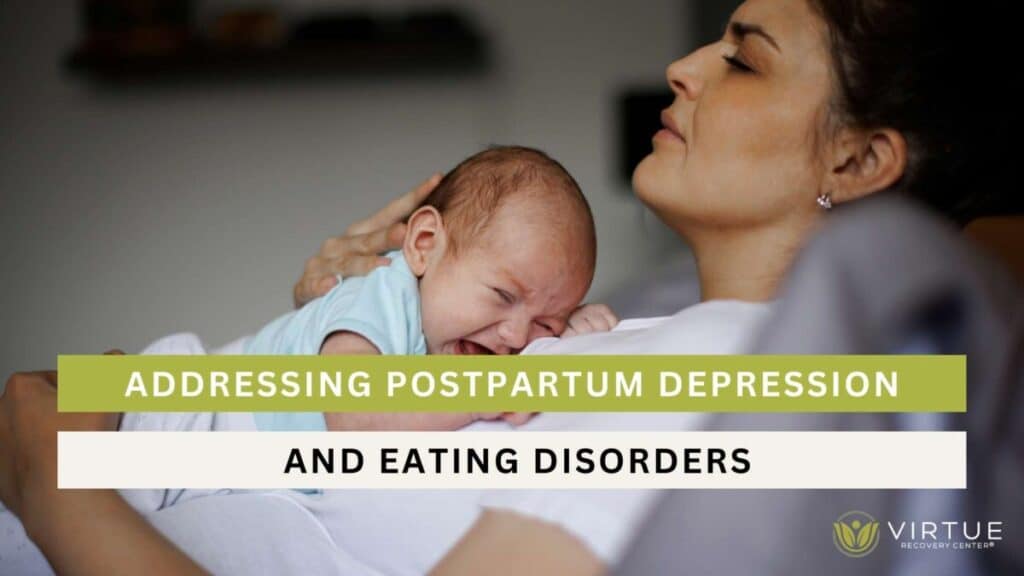Key Takeaways
- Some women who develop depression after birth may also experience eating disorders, which may prolong and complicate the recovery process for the new moms.
- Timely diagnosis and treatment are the primary factors for success and favorable outcomes.
- Various exclusive treatment methods are accessible, while the main aim is to evaluate and treat mental and physical aspects.
Introduction
Frequently pictured as a time of joy and bonding, this experience of motherhood may turn into a challenge for many women who are going through postpartum depression or eating disorders. These conditions can do a lot of harm to the mental health of the new mothers and the mother’s ability to take care of herself and her baby. Understanding and solving these problems is crucial to providing mothers and their families with healthy living.
Understanding Postpartum Depression
PPD is a complex phenomenon incorporating physical, psychological, and behavioral changes that some women experience after the delivery of a child. It comes with symptoms such as feelings of extreme depression, fatigue, and anxiety, which can be so severe as to frustrate a woman’s ability to look after herself or her family. Contrary to the “baby blues,” PPD is more severe and potent and may not disappear unless appropriately treated.
Exploring the Link with Eating Disorders
These women may suffer from eating disorders, which can be anorexia, bulimia, or binge eating forms. The development of body image concerns, hormone changes, and stress during postpartum are the leading causes of these disorders. There is a connection between PPD and eating disorders because they can be mutually reinforcing with a cycle that may be difficult to escape alone.
Risk Factors and Diagnosis
A family history of mental health issues, feeling alone, not being supported, having a lousy self-image, and a previous eating disorder may increase the risk of both postpartum depression and eating disorders. In many cases, a person must talk with a healthcare provider face to face, who can examine the symptoms and suggest medication.
Treatment Options for Postpartum Depression and Eating Disorders
The treatment could use CBT (Cognitive Behavioral Therapy) or DBT (Dialectical Behavioral Therapy) models of therapy to manage thought patterns related to mood and eating habits. Medications can include antidepressants to help with symptoms of depression. For eating disorders, nutrition counseling and therapy that will normalize the eating behavior is paramount.
Supporting Recovery and Wellness
Recovery, which is not only taking treatment but rebuilding the environment, is a complicated process. It needs the help of the members of the family the most. Support can be of benefit to first-time mothers. Besides that, she might prefer practicing mindfulness and relaxation skills and scheduling a routine that includes time for self-care. Families can help with emotional recovery by holding and assisting in baby care and referring to professional care when needed.
Conclusion
Postpartum depression and eating disorders are serious but treatable conditions that affect many women. Recognizing the signs and seeking help early can lead to effective recovery. With the proper support and treatment, mothers can manage these conditions successfully. If you or someone you know is struggling with these issues, don’t hesitate to contact Virtue Recovery Center at 855-788-5582 for guidance and support.
FAQs
What are the signs of postpartum depression?
Look for persistent sadness, loss of interest in enjoyable activities, and difficulty bonding with the baby.
How do eating disorders develop postpartum?
They often stem from pre-existing body image issues, exacerbated by postpartum body changes and stress.
What should I do if I suspect a loved one is suffering?
Please encourage them to speak with a healthcare provider and offer to support them through the process.
Are specific therapies effective for these conditions?
Yes, therapies like CBT, DBT, and nutritional counseling are effective.
How can family members support a new mother?
Be understanding, offer practical help with childcare, and encourage professional support.
What resources are available?
Many healthcare providers provide referrals to specialists in postpartum mental health and eating disorders.
Resources
https://www.liebertpub.com/doi/abs/10.1089/jwh.2007.0550
https://link.springer.com/article/10.1186/s12884-018-1745-x
https://onlinelibrary.wiley.com/doi/full/10.1002/eat.22088
https://ajp.psychiatryonline.org/doi/full/10.1176/appi.ajp.158.9.1461
https://www.ncbi.nlm.nih.gov/pmc/articles/PMC3113417/
https://www.womenshealth.gov/mental-health/mental-health-conditions/postpartum-depression
- About the Author
- Latest Posts
Gigi Price holds licenses as a Master Social Worker and Clinical Drug Counselor. She completed her master’s degree in Social Work at Texas State University. Over the last decade, Gigi has been dedicated to utilizing evidence-based practices to enhance patient care and treatment planning, resulting in positive, long-term outcomes for patients and their families. Her passion lies in creating a treatment environment where professionals collaborate to bring about positive change and provide a safe, trustworthy therapeutic experience. Patients can be confident in receiving top-quality care under her leadership.
In her role as the Clinical Director of Virtue Recovery Houston, Gigi conducted research to identify the most effective approaches for treating patients with acute mental health diagnoses, PTSD, and Substance Use Disorder. She then assembled a team of skilled clinicians who could offer various therapeutic modalities, such as Cognitive Behavioral Therapy (CBT), Dialectical Behavioral Therapy
(DBT), Acceptance and Commitment Therapy (ACT), Somatic Exposure, Eye Movement Desensitization and Reprocessing (EMDR), and Cognitive Processing Therapy (CPT). Gigi takes pride in overseeing the development and implementation of Virtue Houston’s Treatment Program, which includes two specialized therapeutic curricula tailored to the unique needs of individuals struggling with mental health issues, addiction, and PTSD.









